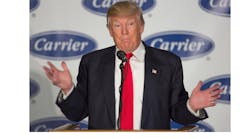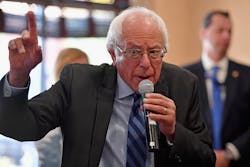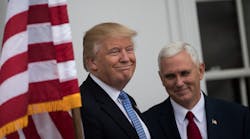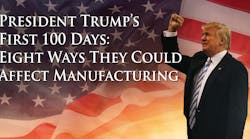Latest from Industry Trends
Authors: Mark Niquette, Richard Clough and Kevin Cirilli
President-elect Donald Trump said he called the top executive of United Technologies Corp. shortly after his election and told him not to close a Carrier factory in Indianapolis that became a symbol of the Republican’s outsider campaign for the White House.
“I called Greg and I said it’s really important, you have to do something because you have a lot of people leaving,” Trump said about his call to Greg Hayes, the company’s chairman, president and CEO, at the Carrier factory on Thursday, where he appeared with Vice President-elect Mike Pence, the current governor of Indiana. “You have to understand, we can’t allow this to happen anymore with our country.”
Carrier agreed to keep about 1,100 jobs in Indianapolis while moving about 1,300 positions to Mexico in exchange for $7 million in tax and other incentives from the state.
The deal is a clear political victory for Trump, who can claim to have accomplished a major campaign promise more than a month before he even enters office. During his run, he repeatedly railed against Carrier for its plan to move the Indianapolis gas-furnace factory to Mexico. But union workers and economists say that pressuring individual factory owners won’t save U.S. manufacturing jobs lost to economic forces beyond the control of companies or the president.
Less than a mile from the Carrier plant that Trump and Pence are touring Thursday, a bearings factory run by Milwaukee-based Rexnord Corp. is closing, eliminating 350 jobs. The work is going to Mexico, saving the company about $15.5 million a year, the United Steelworkers union said.
“I don’t want everyone to think that solves all the problems with trade,’’ Chuck Jones, the president of United Steelworkers Local 1999, which represents workers at both plants, said of the Carrier deal. “I don’t think Trump or Pence will take the time, nor will they have the time, to address every plant closure.’’
The day after the Nov. 8 election, General Motors Co. announced it would end the third shift at assembly plants in Ohio and Michigan -- two historically Democratic states that Trump won -- in January. The automaker is closing the plants, eliminating almost 2,100 jobs, because consumers prefer trucks and sport-utility vehicles over the small cars built at the two factories.
“In political terms, it’s pretty brilliant,” Jared Bernstein, former chief economist to Vice President Joe Biden, said of Trump’s Carrier deal. “But this is not a sustainable economic policy. You just can’t keep giving away goodies to firms that want to relocate to stop them.”
High Costs
Despite the deal with Trump and Pence, Carrier will still manufacture an old product very expensively in Indianapolis, compared with what it would cost in Mexico, said Michael Hicks, an economics professor at Ball State University in Muncie, Indiana, and director of its Center for Business and Economic Research.
Carrier workers cost about $30 an hour with salary and benefits compared to about $3 a worker in Mexico, Hicks said. The deal also doesn’t alter the trend of falling manufacturing employment that has devastated U.S. communities, even as productivity and output increases with improving technology and automation, he said.
Moving manufacturing to Mexico would have saved Carrier’s parent company, United Technologies Corp., about $65 million a year, which translates to a relatively insignificant 2 cents a share in earnings, said Howard Rubel, an analyst with Jefferies.
While Indiana added 1.4 million net jobs between 1969 and 2014, the percentage in manufacturing declined to 14 percent from 33 percent, Hicks said. Manufacturing output has nonetheless risen to record levels, even as there are fewer workers at factories making less than their fathers and grandfathers, he said.
“For Carrier and Donald Trump, this is a big win,’’ Hicks said. “It doesn’t fix the issues that continue to plague manufacturing communities.’’
‘Hugely Impactful’
Trump made reversing manufacturing job losses, exemplified by the Carrier plant, a mainstay of his presidential campaign, promising to scrap or renegotiate trade deals and slap tariffs on imports if necessary to prevent jobs from leaving the country.
Trump’s promises were met with scorn by Democrats and union leaders who hammered him for making neckties and other products overseas and for using Chinese steel in construction projects. But his message helped the billionaire smash the supposed Democratic firewall in the industrial Midwest and carry the states of Michigan, Ohio, Pennsylvania and Wisconsin to win the Electoral College.
Trump dismissed the idea that a president shouldn’t pressure companies to keep jobs in the U.S.
"I think it’s very presidential. If it’s not presidential that’s okay," he said. "We’re going to have a lot of phone calls to companies that say they’re thinking about leaving this country, because they’re not leaving this country. Leaving the country is going to be very difficult."
Indiana Senator Dan Coats, a Republican, said the Carrier deal sent an important signal.
"Thousands and maybe tens of thousands or hundreds of thousands of workers woke up today and said, ‘My gosh, he’s not even president yet and he’s figured out how to save 1,000 jobs,’” Coats said after meeting with Trump on Wednesday in New York. “It symbolizes more to come. It’s hugely impactful.”
Democratic U.S. Senator Bernie Sanders, who had also called out Carrier during the presidential campaign, said Trump should use defense contracts and other issues as leverage against United Technologies to keep the Indianapolis factory open. The Farmington, Connecticut-based company makes Pratt & Whitney engines for fighter jets and civilian aircraft.
He said on Thursday that Trump had been beaten by the company.
“It is not good enough to save some of these jobs,” Sanders said in a Washington Post op-ed. “Trump made a promise that he would save all of these jobs, and we cannot rest until an ironclad contract is signed to ensure that all of these workers are able to continue working in Indiana without having their pay or benefits slashed.”
“United Technologies took Trump hostage and won,” Sanders said.
Photo: Getty Images
‘Cash Cow’
Hicks said part of Carrier’s motivation may be an attempt to reinforce Trump’s commitment during the campaign to cut corporate taxes and reduce regulations, which would significantly reduce compliance costs and other expenses for manufacturers. Carrier alluded to that in a statement on Wednesday.
“The incoming Trump-Pence administration has emphasized to us its commitment to support the business community and create an improved, more competitive U.S. business climate,’’ the company said.
Carrier also said incentives offered by Indiana “were an important consideration.’’ The state package, which is expected to be considered at a meeting of the Indiana Economic Development Corp. next month, includes grants for job training and tax incentives for additional investment in the plant, said John Mutz, chairman of the group’s policy committee.
Mutz, a Republican and former Indiana lieutenant governor, speculated that a major incentive for Carrier to make a deal was so that United Technologies, a major federal contractor, remains in the Trump administration’s good graces.
That variable doesn’t exist at Rexnord, where the steelworkers’ union couldn’t offer enough concessions to match the company’s $15.5 million in savings from moving work to Mexico. The plant will be closed even though it is profitable, said Don Zering, unit president at Rexnord for Local 1999.
“We’re the cash cow, and they still want more,’’ Zering said. “It’s nothing but greed.’’















